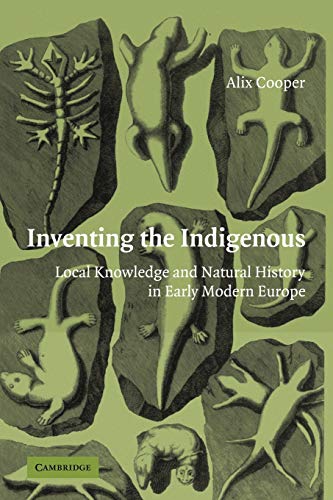Items related to Inventing the Indigenous: Local Knowledge and Natural...

Synopsis
In the wake of expanding commercial voyages, many people in early modern Europe became curious about the plants and minerals around them and began to compile catalogs of them. Drawing on cultural, social and environmental history, as well as the histories of science and medicine, this book argues that, amidst a growing reaction against exotic imports -- whether medieval spices like cinnamon or new American arrivals like chocolate and tobacco -- learned physicians began to urge their readers to discover their own "indigenous" natural worlds. In response, compilers of local inventories created numerous ways of itemizing nature, from local floras and regional mineralogies to efforts to write the natural histories of entire territories. Tracing the fate of such efforts, the book provides new insight into the historical trajectory of such key concepts as indigeneity and local knowledge.
"synopsis" may belong to another edition of this title.
Book Description
Drawing on cultural, social, and environmental history, as well as the histories of science and medicine, this book shows how, amidst a growing reaction against exotic imports -- whether medieval spices like cinnamon or new American arrivals like chocolate and tobacco -- early modern Europeans began to take inventory of their own "indigenous" natural worlds.
About the Author
Alix Cooper is Assistant Professor of History at Stony Brook University, where she teaches early modern European history and the histories of science, medicine, and the environment.
"About this title" may belong to another edition of this title.
US$ 5.38 shipping within U.S.A.
Destination, rates & speedsSearch results for Inventing the Indigenous: Local Knowledge and Natural...
Inventing the Indigenous: Local Knowledge and Natural History in Early Modern Europe
Seller: SatelliteBooks, Burlington, VT, U.S.A.
paperback. Condition: Softcover. Softcover. underlining of text. strong study copy, Seller Inventory # 250502025
Quantity: 1 available
Inventing the Indigenous: Local Knowledge and Natural History in Early Modern Europe
Seller: Bookmans, Tucson, AZ, U.S.A.
Paperback. Condition: Good. . Satisfaction 100% guaranteed. Seller Inventory # mon0002676280
Quantity: 1 available
Inventing the Indigenous : Local Knowledge and Natural History in Early Modern Europe
Seller: GreatBookPrices, Columbia, MD, U.S.A.
Condition: good. May show signs of wear, highlighting, writing, and previous use. This item may be a former library book with typical markings. No guarantee on products that contain supplements Your satisfaction is 100% guaranteed. Twenty-five year bookseller with shipments to over fifty million happy customers. Seller Inventory # 7594658-5
Quantity: 1 available
Inventing the Indigenous : Local Knowledge and Natural History in Early Modern Europe
Seller: GreatBookPrices, Columbia, MD, U.S.A.
Condition: New. Seller Inventory # 7594658-n
Quantity: Over 20 available
Inventing the Indigenous: Local Knowledge and Natural History in Early Modern Europe (Paperback or Softback)
Seller: BargainBookStores, Grand Rapids, MI, U.S.A.
Paperback or Softback. Condition: New. Inventing the Indigenous: Local Knowledge and Natural History in Early Modern Europe. Book. Seller Inventory # BBS-9780521124010
Quantity: 5 available
Inventing the Indigenous: Local Knowledge and Natural History in Early Modern Europe
Seller: Lucky's Textbooks, Dallas, TX, U.S.A.
Condition: New. Seller Inventory # ABLIING23Feb2215580244258
Quantity: Over 20 available
Inventing the Indigenous : Local Knowledge and Natural History in Early Modern Europe
Seller: GreatBookPrices, Columbia, MD, U.S.A.
Condition: As New. Unread book in perfect condition. Seller Inventory # 7594658
Quantity: Over 20 available
Inventing the Indigenous (Paperback)
Seller: Grand Eagle Retail, Mason, OH, U.S.A.
Paperback. Condition: new. Paperback. In the wake of expanding commercial voyages, many people in early modern Europe became curious about the plants and minerals around them and began to compile catalogues of them. Drawing on cultural, social and environmental history, as well as the histories of science and medicine, this book argues that, amidst a growing reaction against exotic imports - whether medieval spices like cinnamon or new American arrivals like chocolate and tobacco - learned physicians began to urge their readers to discover their own 'indigenous' natural worlds. In response, compilers of local inventories created numerous ways of itemising nature, from local floras and regional mineralogies to efforts to write the natural histories of entire territories. Tracing the fate of such efforts, the book provides insight into the historical trajectory of such key concepts as indigeneity and local knowledge. Drawing on cultural, social and environmental history, and histories of science and medicine, this book shows how, amidst a growing reaction against exotic imports - whether medieval spices like cinnamon or new American arrivals like chocolate and tobacco - early modern Europeans began to take inventory of their own 'indigenous' natural worlds. Shipping may be from multiple locations in the US or from the UK, depending on stock availability. Seller Inventory # 9780521124010
Quantity: 1 available
Inventing the Indigenous: Local Knowledge and Natural History in Early Modern Europe
Seller: THE SAINT BOOKSTORE, Southport, United Kingdom
Paperback / softback. Condition: New. This item is printed on demand. New copy - Usually dispatched within 5-9 working days 403. Seller Inventory # C9780521124010
Quantity: Over 20 available
Inventing the Indigenous: Local Knowledge and Natural History in Early Modern Europe
Seller: Ria Christie Collections, Uxbridge, United Kingdom
Condition: New. In. Seller Inventory # ria9780521124010_new
Quantity: Over 20 available

